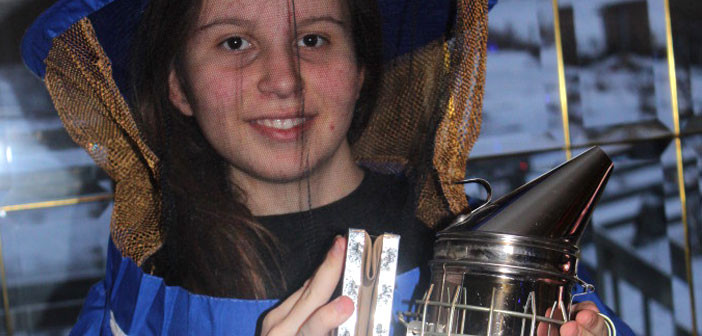
Jordan Winter, Researcher. “I’ve got a goal and it will make the beekeeping community a better place- and a better place for the bees.”
After her family acquired honey bees this fall Jordan Winter set about the task of researching tried and true over wintering techniques of hives inNorthern Ontario. Having found no information online and finding plenty of disparate strategies among beekeepers in the Algoma District, this grade ten Korah High School student recognized the perfect subject for her next science project.
Speaking of her families attempt to find information about regional wintering of honey bees practices Jordan commented, “We did not know what we were doing and there was no specific answer to what we should do. Everybody does it differently and everybody will tell you their way is best. The majority of the research being conducted is taking place in Southern climates where temperatures are not as negative. There isn’t a lot of data into what works here.”
The fifteen year old demonstrates a sincere excitement and passion for science and the love of discovery.
“I thought ‘ok, I’ve got to find this out. What is the best way to over winter bees? I’ve got a goal and it will make the beekeeping community a better place- and a better place for the bees.’ I love science. Both of my parents have a background in environmental science and so I was introduced to science at a young age. I always loved school and I always loved learning. So being able to find my own problem, then solve it myself and then being able to teach people about it…” she pauses for breath. “I just really love it!”
Jordan had a fortunate connection to Dr. Pedro Antunes, an associate professor, at Algoma University. Dr. Antunes has been mentoring Jordan as she conducts her research.
“He thought it was a great project. He’s teaching me how to put together a proper research project and helping with the statistical information so that this study could possibly be accepted as a legitimate paper.”
This past weekend, Jordan recently presented preliminary findings of her research at the Pollinators in Agriculture Symposium hosted by the Rural Agri-Innovation Network (RAIN). Her overall aim is to determine the best strategies to ensure the survivability for the over wintering of honey bees in Northern Ontario.
Jordan developed a survey, comprised of ‘yes’ or ‘no’ options, to determine hive orientation, hive ventilation, feeding over the winter months, insulation materials, location to major crops- particularly corn and soy, and several other variables.
“Every ‘yes’ or ‘no’ variable can be converted into a ‘1’ or a ‘0’. Then based on that, once I collect survival rates, I’ll assign another ‘1’ or ‘0’. I’ll use a logistic regression analysis to try to find combinations that work. I will be able to determine what over wintering techniques are working in the Algoma District.”
Among her early findings gathered from information related to 70 hives, data indicates:
-
71% of hives are within two miles of corn or soybean crops
-
70% of crops are being fed over the winter and not just relying on their own honey source
-
63% of respondents have first year colonies (this is their first over wintering year)
-
most popular insulating and absorbent materials are alpaca wool, followed by an alpaca wool/burlap combination, then a straw/burlap combination and then burlap only
-
quite a few hives use external insulation
-
of those feeding over the winter, feeding sources are evenly matched between sugar water and a pollen cake. (Jordan noted that an interesting find was that some apiarists used fondant “it’s sugar based and doesn’t add moisture to the hive”)
-
Orientation of hive entrances are dominantly southward facing to protect from wind
The first year’s data are intended for the purposes of her high school project however, Jordan intends the project to be an ongoing work.
“I’d like to continue this project for as long as I can. I need to gather several winter data sets or the findings will not be conclusive. It’s not too late for people to participate. They can pick up hard copies of the survey McClelland’s Hardware and Feed in Desbarats or they can email me and I can send people who are interested an electronic version of the survey. The more participation on this project the more accurate my results will be.”
To participate in this much needed and worthwhile study, please fill out a survey by following this link: https://www.
To view Jordan Winter’s preliminary findings you can click this link: https://prezi.com/


